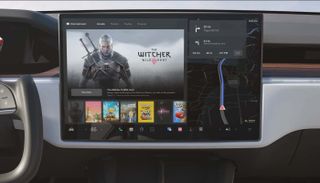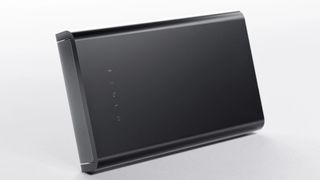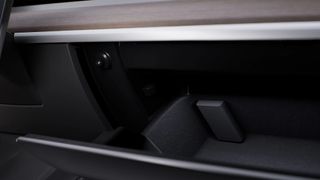Tesla's $350 1TB SSD Can Withstand Vehicle Vibrations Like All SSDs
No word on whether Tesla's new SSD will block your data if you make fun of Elon Musk

Yesterday, Tesla launched its 2022 Holiday Update, which has traditionally been the most significant update of the year for the company's electric vehicles. The biggest addition to the Holiday Update was support for Steam games on 2022+ Model S and Model X vehicles. These EVs feature a potent Ryzen SoC with RDNA2-class graphics and 16GB of RAM, making them perfect for gaming on the large 17-inch center display or the 8-inch display for the rear passengers.
But what will you do for storage with Tesla's ever-expanding gaming portfolio? Well, Tesla would love for you to purchase its new, wildly overpriced 1TB Solid State Drive (SSD). The storage device showed up in the Tesla Shop this week, promising to store everything from "Tesla Arcade games" to "Dashcam footage." That sounds all well and good, but Tesla is asking an astonishing $350 for this 1TB SSD.

To put that price into perspective, we took a quick trip over to Amazon and found several significantly cheaper portable 1TB SSDs, many of which are well under $100:
- Crucial X6 1TB Portable USB 3.2 SSD - $69.99
- Crucial X8 1TB Portable USB 3.2 SSD - $79.99
- Samsung T7 Shield 1TB Portable USB 3.2 SSD - $89.99
- SanDisk 1TB Extreme Portable USB 3.2 SSD - $99.99
So, why should you buy Tesla's branded 1TB SSD when it's five times the price of popular, name-brand portable SSDs? Tesla claims that its 1TB SSD is "automotive-grade," designed to "withstand extreme cabin temperatures" and survive "vehicle shocks and vibrations."
Tesla provides no figures beyond these claims. However, Micron's automotive-grade SSDs have an extended operating temperature range of -40 degrees Celsius to between 85 C and 105 C, while some of Western Digital's automotive-grade SSDs are ruggedized with shock resistance of 1,500g at 0.5ms and vibration resistance of forces of 30g at 7 Hz to 2,000 Hz. Neither company appears to have a portable automotive-grade SSD in its portfolio; regardless, it's likely that Tesla's SSD will be able to withstand some extreme conditions that the average SSD can't.
That said, normal portable SSDs are more than capable of withstanding vibrations and bumps from a regular moving vehicle. As for temperatures, the $89 Samsung T7 Shield has an operating temperature range of 0 C to 60 C, a non-operating temperature range of -40 C to 85 C, and an operating humidity range of 5% to 95%.
So, unless you have the cabin temperature below freezing while you're driving, the Tesla SSD is unlikely to offer any tangible durability advantages over run-of-the-mill SSDs in non-emergency situations.
Stay on the Cutting Edge
Join the experts who read Tom's Hardware for the inside track on enthusiast PC tech news — and have for over 25 years. We'll send breaking news and in-depth reviews of CPUs, GPUs, AI, maker hardware and more straight to your inbox.

Tesla also provides no figures or specs that we could use to compare to existing products on the market. Instead, the product page simply states that its SSD will offer similar read/write speeds. Most of the portable 1TB SSDs we found for under $100 feature read/write speeds ranging from 800 MBps to 1,050 MBps.
Most Tesla EVs come standard from the factory with a 128GB USB thumb drive for Sentry Mode storage. If you're looking to take advantage of the expanded gaming capabilities in the Model S and Model X, there are plenty of great portable SSDs that have more storage and cost less than the new Tesla SSD, which doesn't really seem like a good option unless you like throwing money away.
But if your heart is set on a brand-new Tesla-branded 1TB SSD, the drive will go on sale in February 2023 for $350.
Brandon Hill is a senior editor at Tom's Hardware. He has written about PC and Mac tech since the late 1990s with bylines at AnandTech, DailyTech, and Hot Hardware. When he is not consuming copious amounts of tech news, he can be found enjoying the NC mountains or the beach with his wife and two sons.
- Sarah Jacobsson PurewalSenior Editor, Peripherals
-
USAFRet And I should buy this silly thing why, exactly?Reply
Tesla is the new Apple?
Calling all fanbois! Swarm swarm swarm!! -
Udyr ERMAHGERD! I want 4 for my full Corsair build!!!Reply
No, seriously... read the room before you price your stuff. But I'm pretty sure it's gonna be "justified" because of the design, some proprietary connectors and some other silly stuff. -
King_V Look, he's gotta find SOME way to repay all that money he borrowed to acquire Twitter... $350 for a 1TB SSD in today's market of cratering SSD prices sounds like enough margin per unit to put a dent in all that debt.Reply
Assuming he can find enough suckers to pay that much. -
JTWrenn Tom's should get a unit and test if it is indeed spec'd for anything better than a normal external SSD. It's always possible it actually is...even if it is not necessary, but knowing Tesla it is mostly likely just a fancy outside on an off the shelf external SSD and they should be exposed for it.Reply -
drivinfast247 Reply
He'll be fine. He found enough people to buy a silly electric car.King_V said:Look, he's gotta find SOME way to repay all that money he borrowed to acquire Twitter... $350 for a 1TB SSD in today's market of cratering SSD prices sounds like enough margin per unit to put a dent in all that debt.
Assuming he can find enough suckers to pay that much. -
umeng2002_2 I find it funny that the writers for Tom's are complaining about social media blocking now.Reply -
bigdragon This is ridiculous for a 1TB SSD. Reminds me of when Subaru demanded $250 to update the maps in the BRZ I used to have. Why should I pay when I get free maps over the internet, my phone, and my old standalone GPS? Automotive companies love to gouge. Tesla, Subaru, BMW, GM, Lexus -- they all pull this crap all the time.Reply -
drivinfast247 Reply
$1200/year will allow you the full potential of your vehicle. https://www.thedrive.com/news/mercedes-makes-better-performance-a-1200-subscription-in-its-evsbigdragon said:This is ridiculous for a 1TB SSD. Reminds me of when Subaru demanded $250 to update the maps in the BRZ I used to have. Why should I pay when I get free maps over the internet, my phone, and my old standalone GPS? Automotive companies love to gouge. Tesla, Subaru, BMW, GM, Lexus -- they all pull this crap all the time. -
emike09 This is just another Elon/Tesla clickbait article that doesn't provide any factual data and is opinion based. What has Toms Hardware fallen to? The comments here also blow my mind and are all opinion based or the voices of people uneducated or unexperienced in IT infrastructure.Reply
This article did not provide any data backing up why this drive isn't better, or why other SSD's can or cannot handle the extreme environments that cars go through. Here in Utah, we spend 4 months below freezing, with temps often hitting 0F or sometimes down to -30F. In the summer, we have temps that reach up to 110F. In a sealed vehicle in the summer, those internal temps can easily hit 170F+ on the hottest days. How do SSDs handle going from one extreme to another? What about vibration and impact resistance from potholes during both extremes of temperature? What about endurance during these extremes?
My 4 NVMe drives, several SATA SSDs, and 8 HDDs sit in a controlled home environment that only experience minor temp swings and almost zero vibration (my footsteps and cats running around). Why would you compare the average environment to that of a vehicle?
Long story short, I highly doubt the listed consumer USB SSDs can handle 10-15 years of massive stress that a certified automotive-approved SSD can go through. This entire article is about as amateur as a writer could ever write and screams novice in IT and a hater of Elon's works. Brandon Hill, take your opinions and personal preferences elsewhere. Write an article that is based on facts and not your own opinions. -
USAFRet Reply
Well, the microSD cards in my various dashcams have endured (almost) that temp swing.emike09 said:This article did not provide any data backing up why this or other SSD's can or cannot handle the extreme environments that cars go through. Here in Utah, we spend 4 months below freezing, with temps often hitting 0F or sometimes down to -30F. In the summer, we have temps that reach up to 110F. In a sealed vehicle in the summer, those internal temps can easily hit 150F+ on the hottest days. How do SSDs handle going from one extreme to another? What about vibration and impact resistance from potholes during both extremes of temperature? What about endurance during these extremes?
In operation for several years.
None failed yet.
Also, this particular device is not necessarily for installation IN the car, but rather just another external drive.
Like buying a RollsRoyce or Ferrari branded drive. meh, except for the label.
Most Popular


